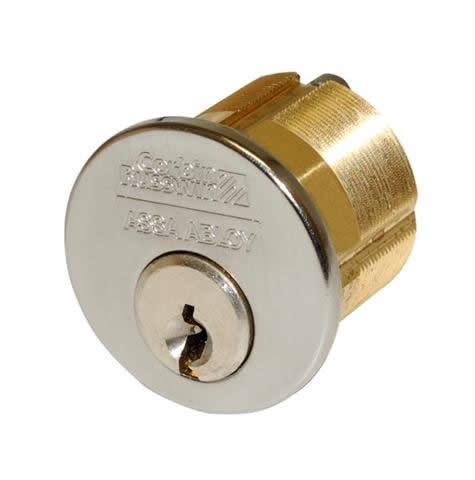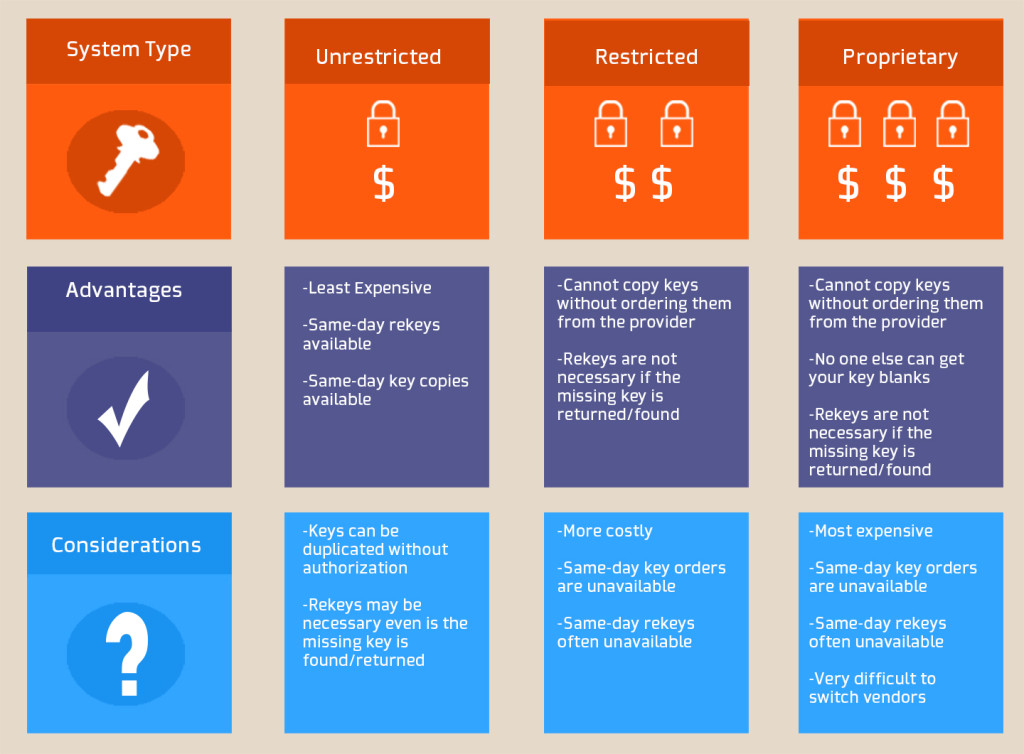 If you’re in the process of developing or re-evaluating your key system program, you might feel like pulling your hair out. There are many choices to be made from system type, to cylinder type, to optional features and beyond.
If you’re in the process of developing or re-evaluating your key system program, you might feel like pulling your hair out. There are many choices to be made from system type, to cylinder type, to optional features and beyond.
One of the first decisions to make is what type of key system you want to use. There is no right or wrong system; it’s all about selecting a product that will best serve your facility. One of our customers views their key system as a means of keeping the doors from blowing open. When designing their system they said to us, “Everyone has a key to our store; it’s called a brick.” As such, they rely on security alarms to secure their facilities and use a low-cost key system with an unrestricted keyway. On the other end of the spectrum, we have customers who only want authorized individuals to have access to their keys which justifies the use of restricted systems.
To start your selection process, answer this question: Does the thought of people easily being able to copy your store keys concern you? Your answer will determine if you need an unrestricted, restricted, or proprietary keyway.
If you determine that some of your locks require restricted systems while others only need an unrestricted system, you can set up and maintain separate systems; however, this can quickly become a hassle to maintain. In instances like this, we would recommend implementing one master system.
Unrestricted Key Systems
Unrestricted systems are the most basic and least expensive systems on the market. The keyways are available to the general locksmithing community. Because of this, they offer the benefit of same-day rekeys and key copies. Since the key blanks are widely available, a local locksmith, when given the proper keying information, can rekey a store on an emergency basis. Likewise, they can cut same-day keys.
The disadvantage of the key blank being widely available is that keys can easily be copied without proper authorization. Although “do not duplicate” may be stamped on your keys, there is no legal punishment for those that make copies. In fact, there are self-serve kiosks at many of the big-box retailers that can copy these keys as well.
As a result, anyone can get a copy of your store keys, and when an employee quits or is terminated, you may need to rekey the store regardless of whether or not he/she returns the key. You don’t know if he/she made an unauthorized key copy or not. The company that adheres to the “a brick is a universal key” concept simply changes the alarm code when an employee leaves the organization. In rare and extreme cases, they will rekey the store as an added layer of precaution.
Restricted Key Systems
A step up from unrestricted systems, restricted systems offer a higher level of security because of the restrictions in making copies of keys. All key and core orders must be placed through an authorized dealer. As such, if an employee quits or is terminated, as long as the keys are returned, there is no need to rekey the store. With the added level of security and personalization, restricted key systems do come with a higher price tag than unrestricted systems; however, the level of security often outweighs the cost.
Should you decide to select a restricted system, bear in mind that because of the added security, some conveniences are sacrificed. Due to the fact that your keys and cores must be ordered from a dealer as opposed to a local locksmith, same-day rekeys and same-day key copies are often unavailable. There are rekeyable systems that allow you to perform same-day rekeys.
Proprietary Key Systems
The most sophisticated form of key system, proprietary systems are restricted systems with a higher level of security. Key blanks are available for one specific customer – no one else will be able to get a copy of that key blank.
The customer can be defined as the end-user or as the key system vendor. If the end-user owns the keyway, they can either purchase their keys directly from the manufacturer, or they can set up a distribution program with the manufacturer and a designated vendor. The vendor would be contractually obligated to restrict the key blanks specifically for that end-customer.
Conversely, if the vendor is the end-customer, the proprietary key system can be used for any of their customers. Key manufacturers closely track the sale of the keys; if a key is sold via an unauthorized channel, the manufacturers can and usually will take legal recourse. Medeco is well known for tightly monitoring their proprietary systems. Proprietary systems are the most costly system type and provide the highest level of security.
Like restricted systems, you will sacrifice the convenience of same-day rekeys and key copies. Moreover, once you have committed to a vendor partner, it can be a lengthy process should you decide to terminate the relationship and transfer key records and blanks. If your system is proprietary to your vendor, be aware that should you leave, you will no longer be able to purchase keys or cores on that system. It is for this reason that end-user proprietary systems are more popular than vendor systems.
After deciding what type of system to use, you will need to select the cylinder type, optional features such as rekeyable cylinders and master system setups, and you will also need to establish clear policies and procedures. For more information, check out our comprehensive Key Systems 101 article or download our white paper.

